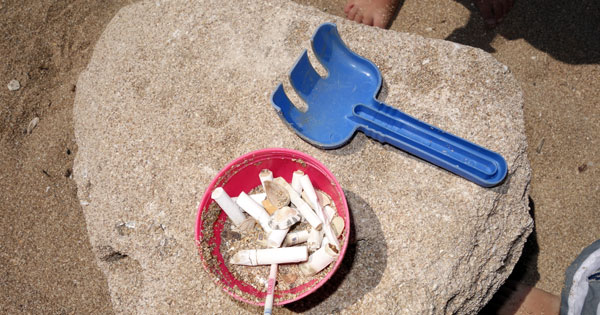
On a recent beach visit, I undertook a mini-environmental cleanup. In an area roughly the size of a spread-out beach blanket, I found the following items:
One seashell
Two sunflower seed shells
Four pistachio shells
One lollipop stick
24 cigarette butts.
Two dozen cigarette butts littering eight square feet of seashore would hardly come as a surprise to Tom Novotny, professor of epidemiology at San Diego State University. “About a third of all the trash picked up in beach and urban cleanups worldwide is cigarette butt waste,” he wrote to me in an email. According to a review that he and his colleague Elli Slaughter published recently in the journal Current Environmental Health Reports, an estimated 4.5 trillion of the six trillion cigarettes smoked globally each year are discarded thoughtlessly as butts, resulting in “the most ubiquitous form of litter worldwide.”
That makes cigarettes a toxic-waste problem as much as a health issue, Novotny says. The chemicals in cigarette tobacco and smoke include such carcinogens as formaldehyde and benzene but also pesticides, herbicides, fungicides, and rodent poisons used in tobacco agriculture. Filters, discarded as butts, are made from non-biodegradable plastic fibers of cellulose acetate. Studies have shown that chemicals from butts and associated “tobacco product wastes” can leach into salt water and fresh water, where they are toxic to fish and aquatic microorganisms.
For these reasons, Novotny believes that we should treat cigarette smoking and butt littering as an environmental issue—for example, mandating that the tobacco industry be held responsible for “cleanup and nuisance costs” associated with butt waste. Although antilittering laws exist, they are often ineffective or unenforced, and bans on indoor smoking almost certainly correlate to an increase in butt-strewn streets. Better yet would be the so-called extended-producer responsibility laws for cigarette butts, measures similar to those that already mandate that manufacturers recycle or dispose of hazardous consumer products such as batteries, fluorescent lighting, paint, and pesticide containers.
Alternatively, or in addition, cigarettes could be sold with a “butt deposit,” refunded when the filters are returned to the vendor or hazardous disposal site; as with deposits on plastic bottles and aluminum cans, the measure could produce an income source for butt collectors.
No such cleanup schemes exist, Novotny wrote, but “it is much more important to try to reduce the source of the waste than to simply clean it up. Thus, in California, a law to ban the sale of filtered cigarettes was introduced in the [State] Assembly last January and will come before it again in the next session. I think this has a real shot at diminishing the tobacco waste product, as it will eliminate the plastic, discourage new smokers from inhaling, and encourage current smokers to quit.”
Eliminating filters may improve smokers’ health, as well. Research indicates that filters do not, in fact, reduce the health risks of cigarettes: after their introduction in the 1950s and 1960s, smokers began taking deeper and faster puffs in order to take in more nicotine—a phenomenon known as “compensatory smoking.” “We are studying the impact of switching smokers to unfiltered cigarettes,” Novotny said, “as we are convinced that the filter, rather than protecting smokers from the hazards of smoking, actually increases their risks. They are a fraud.”

